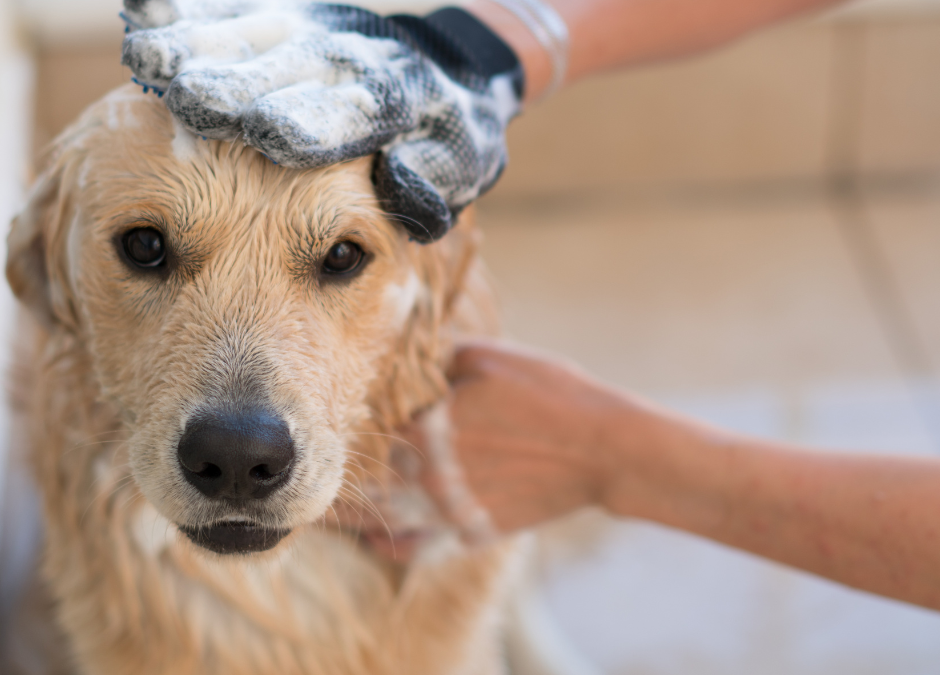Most of us, pet parents or not, are familiar with a skunk spray’s lingering and unmistakable scent. Unfortunately, our pets and skunks meet more often than we would like and almost always at the most inconvenient times. And when they do, they bring home that pungent smell as a souvenir.
But what exactly is skunk spray, and is it harmful to our pets or just highly unpleasant? Read on for our guide to the odor, how to avoid a skunk encounter, and what to do if your pet gets sprayed by a skunk.
What Is Skunk Spray?
Skunks have two sacs in their anus, which store an oily substance produced by the glands lining the sacs. The oil is exceptionally foul-smelling and is chemically composed of seven volatile compounds known as thiols, which easily bind to skin and hair. Because the substance is an oil, it cannot be washed away with a simple water bath, and the skunk smell may even become worse if the pet gets wet.
Why Do Skunks Spray?
Dogs especially are curious creatures and tend to investigate any wildlife they see. Generally, skunks are relatively docile and will give a warning if feeling threatened or scared by stamping their feet, hissing, and raising their tail over their backs before spraying. Since the spray takes a few weeks for the skunk to generate, they typically don’t want to spray, but won’t hesitate to defend themselves, especially if they have baby skunks nearby.
Skunks can control where and exactly when they spray with startling accuracy up to 15 feet away. And, since most dogs first investigate skunks with their noses, they are often sprayed in the head, face, or eyes.
If A Skunk Sprays Your Pet
Skunk spray has an offending odor, of course, but it can also cause health problems for your pet. If your pet is sprayed, it’s essential to determine the extent of the attack. First, quickly assess to ensure the skunk has not bitten or scratched your pet. Skunks are notorious carriers of the rabies virus, and any broken skin from a bite or a scratch needs to be addressed by a veterinarian immediately.
If your pet is sprayed in the eyes, it can cause temporary blindness or corneal irritation, which could result in corneal damage. Seek veterinary care immediately if your pet is squinting or won’t open their eyes.
In addition to eye problems, skunk spray can also cause nausea, vomiting, and, in extreme cases, anemia. If your pet has pale gums, dark urine, or yellowish skin, especially if accompanied by lethargy, seek veterinary care immediately and emergency care if your primary veterinarian is unavailable.
After determining that the smell is the worst part of the spray, you can focus on relieving your pet of the odor.
How To Get Rid of Skunk Odor
The best way to eliminate the skunk odor is to wash it off immediately. The longer it stays on their fur or skin, the harder it will be to remove.
Keep your pet outside to prevent the odor from making contact with your furniture, rugs, or any other animals that may be living in your home. Commercial over-the-counter skunk odor removal products for pets are effective, but skunk sprays often happen at night when stores are closed. The homemade solution below can be used as an alternative.
The basic recipe is:
- 1 quart of 3% hydrogen peroxide (available at any pharmacy)
- 1/4 cup baking soda
- One teaspoon of liquid dishwashing soap (such as Dawn)
Once mixed (don’t add water!), apply to the coat and skin, and wash off thoroughly with fresh water. Bear in mind that peroxide can bleach fur if left on too long. Also, ensure the solution doesn’t get into the eyes, mouth, or nasal passages, as hydrogen peroxide can be irritating. Finally, follow the skunk solution wash with a second bath using pet shampoo and dry your pet thoroughly.
How To Avoid A Skunk
Skunks become more active in the warmer weather, especially at dawn and dusk, so keeping a close watch on your pet during those times is a must. In addition, a leash may be necessary if your dog doesn’t have a reliable recall.
Skunks look for easily accessible places to hide, so one easy way to avoid them is to find and fix any areas around your yard and house that may be attractive to these critters.
These might include:
- Crawl spaces under the house
- Near wood or rock piles
- Under a deck or shed
- Openings under concrete slabs
Skunks are also attracted to garbage and pet food left outside overnight, so bring in any free feeding bowls and keep trash cans tightly closed.
If your pet has been sprayed by a skunk in the face or eyes, give us a call at (802) 863-2387 so we can help. Due to the heavy caseload, wait times may be prolonged. We are here for you 24-hours a day, every day of the week, even on holidays.

